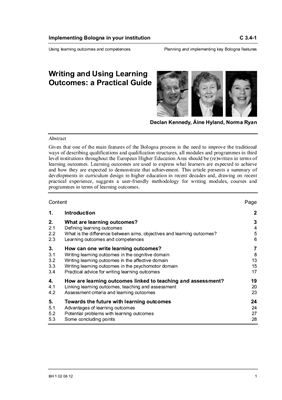Bologna Handbooks,bologna(собачка)raabe.de Implementing Bologna in
your institution, C 3.4-1
Given that one of the main features of the Bologna process is the need to improve the traditional
ways of describing qualifications and qualification structures, all modules and programmes in third
level institutions throughout the European Higher Education Area should be (re)written in terms of
leaing outcomes. Leaing outcomes are used to express what leaers are expected to achieve
and how they are expected to demonstrate that achievement. This article presents a summary of
developments in curriculum design in higher education in recent decades and, drawing on recent
practical experience, suggests a user-friendly methodology for writing modules, courses and
programmes in terms of leaing outcomes.
Given that one of the main features of the Bologna process is the need to improve the traditional
ways of describing qualifications and qualification structures, all modules and programmes in third
level institutions throughout the European Higher Education Area should be (re)written in terms of
leaing outcomes. Leaing outcomes are used to express what leaers are expected to achieve
and how they are expected to demonstrate that achievement. This article presents a summary of
developments in curriculum design in higher education in recent decades and, drawing on recent
practical experience, suggests a user-friendly methodology for writing modules, courses and
programmes in terms of leaing outcomes.

